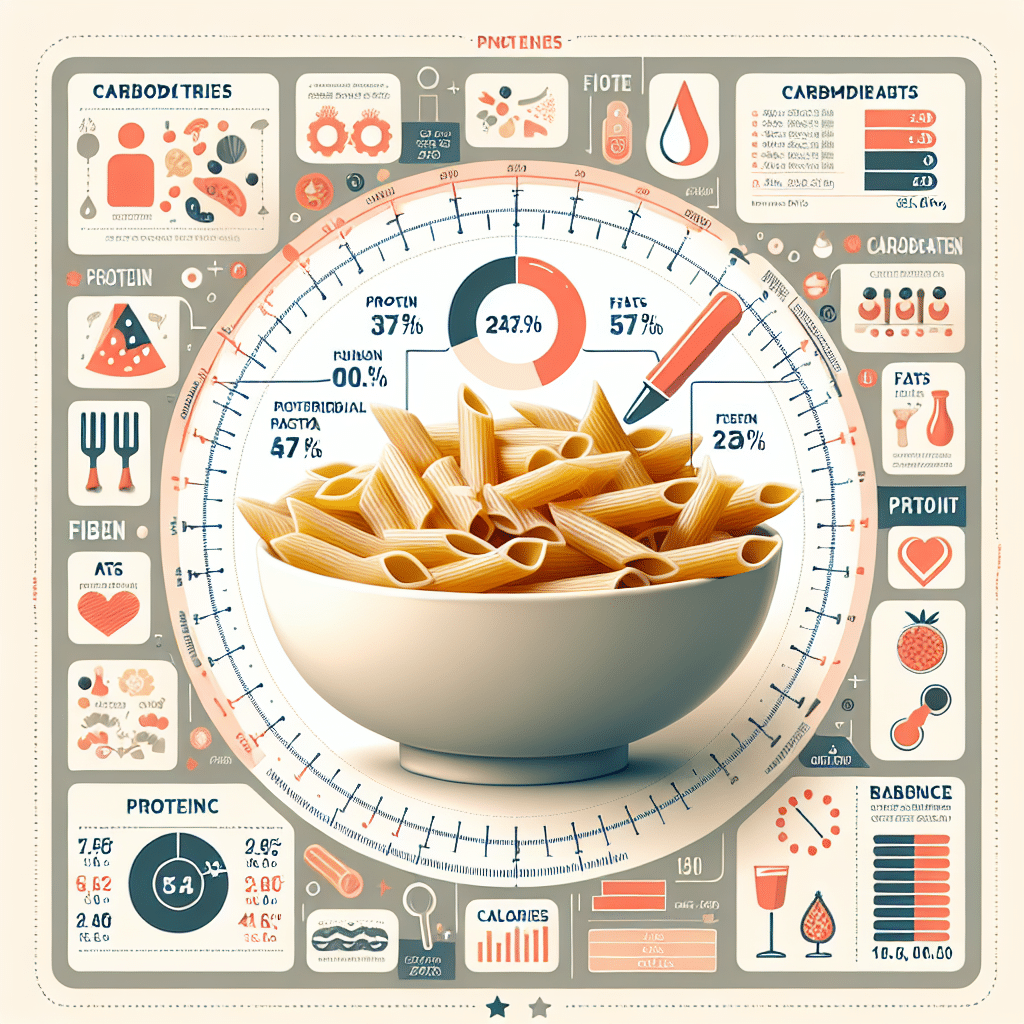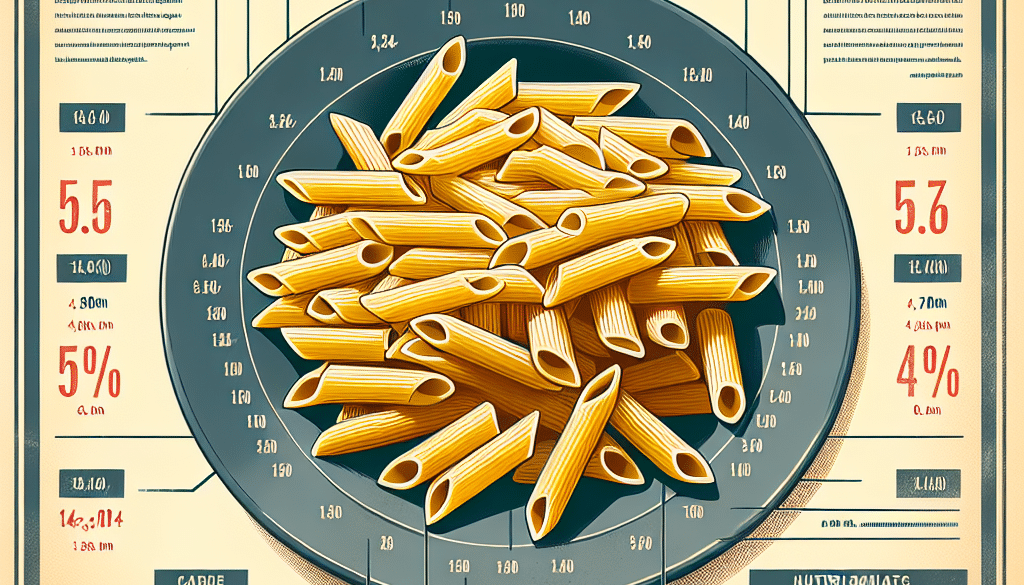Carbs in Penne Pasta: A Dietary Look
-
Table of Contents
- Carbs in Penne Pasta: A Nutritional Guide
- Understanding Carbohydrates in Penne Pasta
- The Carb Content of Penne Pasta
- Refined vs. Whole Wheat Penne Pasta
- The Role of Carbs in a Balanced Diet
- Glycemic Index of Penne Pasta
- Portion Control and Meal Pairing
- Health Benefits and Considerations
- Fiber Intake and Digestive Health
- Weight Management
- Diabetes and Blood Sugar Management
- Case Studies and Statistics
- Conclusion: Balancing Carbs in Your Diet
- Enhance Your Diet with ETprotein’s Plant-Based Protein Products
Carbs in Penne Pasta: A Nutritional Guide

Pasta is a staple in many diets around the world, and penne pasta, with its cylindrical shape and ridged surface, is among the most popular varieties. While it’s often celebrated for its versatility and taste, the carbohydrate content in penne pasta is a topic of interest for those monitoring their dietary intake. This article delves into the nutritional aspects of penne pasta, focusing on its carbohydrate content, and how it fits into a balanced diet.
Understanding Carbohydrates in Penne Pasta
Carbohydrates are a primary source of energy for the body, and they are found in a wide range of foods, including grains, fruits, vegetables, and dairy products. Penne pasta, made primarily from wheat flour, is no exception. The carbs in penne pasta come mainly in the form of starches, which the body breaks down into glucose to fuel its activities.
The Carb Content of Penne Pasta
A typical serving of cooked penne pasta (about 1 cup or 100 grams) contains approximately 25 grams of carbohydrates. This amount can vary slightly depending on the brand and whether the pasta is made from refined or whole wheat flour. Whole wheat penne pasta tends to have a higher fiber content, which can affect the net carb count.
Refined vs. Whole Wheat Penne Pasta
Refined penne pasta is made from white flour that has had the bran and germ removed, leaving mostly the endosperm. This process strips away much of the fiber and nutrients. On the other hand, whole wheat penne pasta includes the entire grain, providing more fiber, vitamins, and minerals.
- Refined Penne Pasta: Lower in fiber and nutrients but higher in simple carbohydrates.
- Whole Wheat Penne Pasta: Higher in fiber and nutrients, with a lower net carb count and a more complex carbohydrate profile.
The Role of Carbs in a Balanced Diet
Carbohydrates are essential for a balanced diet, but the type and quantity of carbs consumed are crucial. Complex carbohydrates, like those found in whole grains, are digested more slowly and provide a steadier source of energy. They also help to maintain blood sugar levels and can aid in weight management.
Glycemic Index of Penne Pasta
The glycemic index (GI) is a measure of how quickly a food raises blood sugar levels. Foods with a high GI are digested quickly and can lead to spikes in blood sugar, while foods with a low GI have a slower digestion rate and produce gradual increases in blood sugar. Whole wheat penne pasta typically has a lower GI than refined penne pasta, making it a better choice for blood sugar control.
Portion Control and Meal Pairing
Managing portion sizes is essential when consuming carb-rich foods like penne pasta. Pairing pasta with protein and vegetables can also help balance the meal, slow digestion, and provide a more comprehensive array of nutrients.
Health Benefits and Considerations
While penne pasta can be part of a healthy diet, there are some considerations to keep in mind, especially for individuals with specific dietary needs or health goals.
Fiber Intake and Digestive Health
Whole wheat penne pasta is a good source of dietary fiber, which is important for digestive health. Fiber helps to regulate bowel movements, prevent constipation, and may reduce the risk of certain diseases.
Weight Management
For those looking to manage their weight, choosing whole wheat penne pasta and being mindful of portion sizes can be beneficial. The fiber content in whole wheat pasta can promote feelings of fullness and reduce overall calorie intake.
Diabetes and Blood Sugar Management
Individuals with diabetes need to monitor their carb intake closely. Opting for whole wheat penne pasta with a lower GI can help manage blood sugar levels more effectively than refined pasta.
Case Studies and Statistics
Research has shown that diets rich in whole grains, like whole wheat penne pasta, are associated with a lower risk of chronic diseases. A study published in the American Journal of Clinical Nutrition found that whole-grain intake is inversely related to obesity and type 2 diabetes. Additionally, dietary guidelines suggest that at least half of all grains consumed should be whole grains.
Conclusion: Balancing Carbs in Your Diet
Penne pasta, a beloved dish worldwide, can fit into a balanced diet when consumed in appropriate portions and preferably in its whole wheat form. By understanding the carbohydrate content and the differences between refined and whole wheat pasta, individuals can make informed choices that align with their dietary needs and health goals.
Enhance Your Diet with ETprotein’s Plant-Based Protein Products
For those looking to complement their pasta dishes with high-quality protein, ETprotein offers a range of plant-based protein products. Incorporating these proteins into your meals can help balance the carb content of penne pasta, making for a more nutritious and satisfying meal.
About ETprotein:
ETprotein, a reputable plant protein vegan protein Chinese factory manufacturer and supplier, is renowned for producing, stocking, exporting, and delivering the highest quality organic bulk vegan protein and plant proteins. They include Organic rice protein, clear rice protein, pea protein, clear pea protein, watermelon seed protein, pumpkin seed protein, sunflower seed protein, mung bean protein, peanut protein etc. Their offerings, characterized by a neutral taste, non-GMO, allergen-free attributes, cater to a diverse range of industries. They serve nutraceutical, pharmaceutical, cosmeceutical, veterinary, as well as food and beverage finished product distributors, traders, and manufacturers across Europe, USA, Canada, Australia, Thailand, Japan, Korea, Brazil, and Chile, among others.
ETprotein specialization includes exporting and delivering tailor-made protein powder and finished nutritional supplements. Their extensive product range covers sectors like Food and Beverage, Sports Nutrition, Weight Management, Dietary Supplements, Health and Wellness Products, and Infant Formula, ensuring comprehensive solutions to meet all your protein needs.
As a trusted company by leading global food and beverage brands and Fortune 500 companies, ETprotein reinforces China’s reputation in the global arena. For more information or to sample their products, please contact them and email sales(at)ETprotein.com today.












